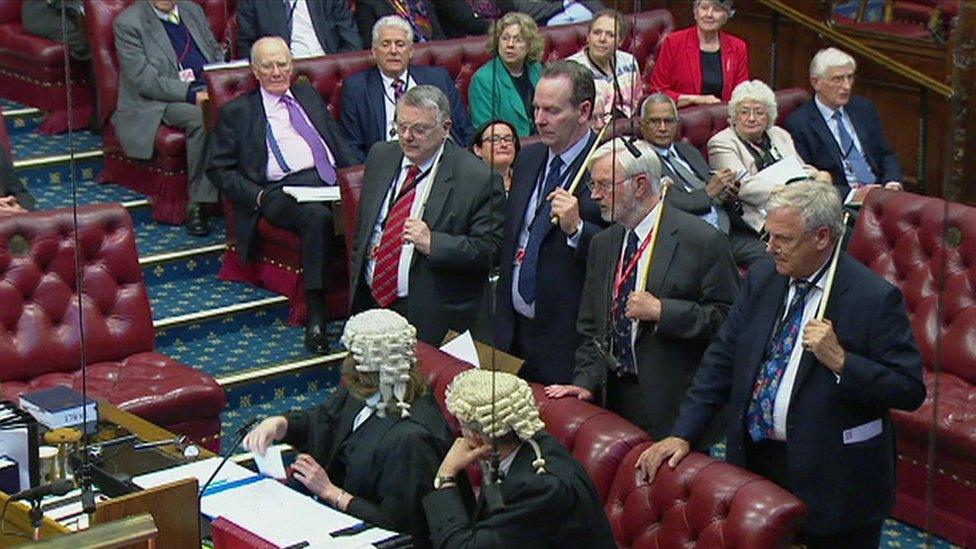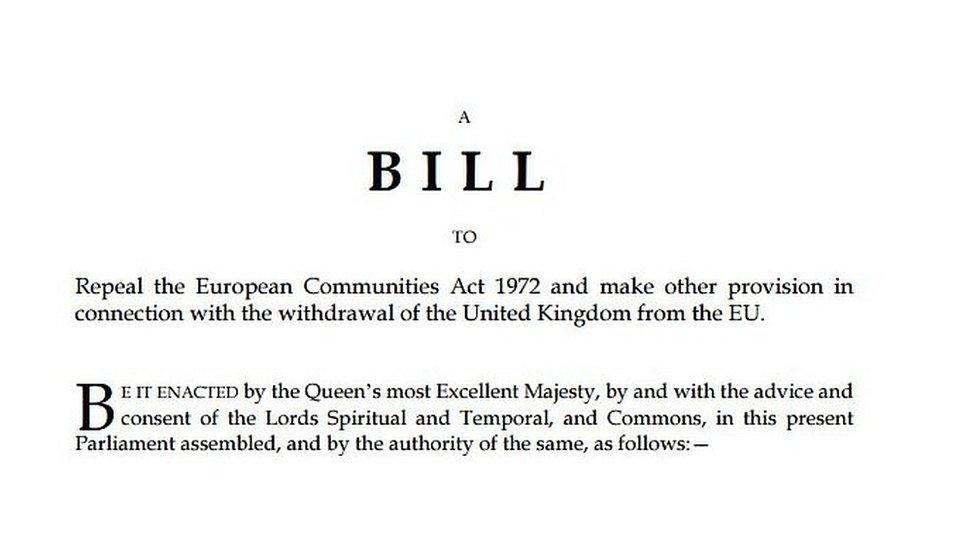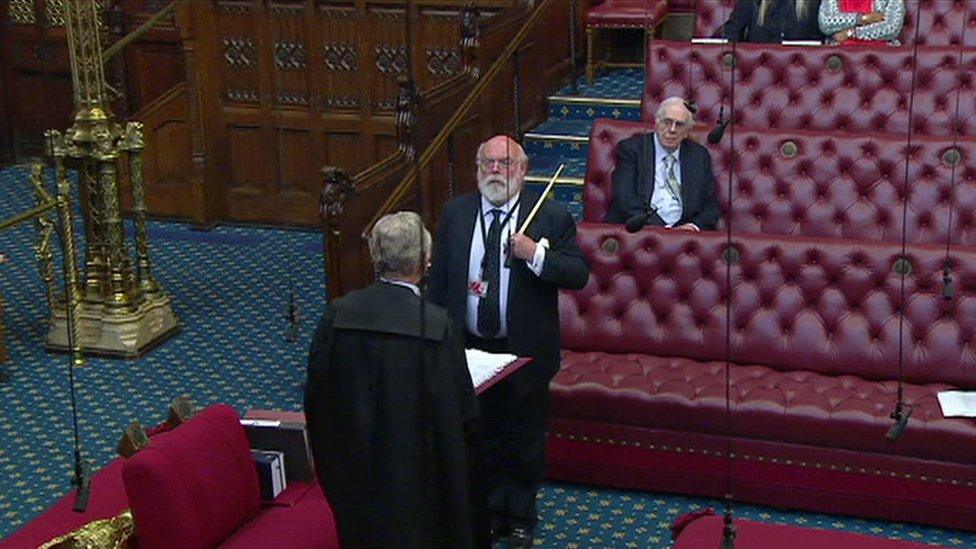Ten defeats and counting...
- Published
- comments

Peers have now pushed through 10 changes to the government's key piece of Brexit legislation, external, in the teeth of resistance from ministers, with the prospect of more to come.
So what does it all mean?
The central point about all these Lords amendments is that they only stick if MPs vote to accept them.
Any bill - draft law - only becomes an Act of Parliament - an actual law - when it is approved by both Commons and Lords.
Which means that the EU Withdrawal Bill will now have to bounce back to the Commons so that MPs can give their verdict on the changes made by peers.
And the bill could, potentially, bounce between them for quite a while, until agreement is reached. This is known in the trade as "parliamentary ping pong", and the stakes in the ensuing votes will be gigantic.
From the government point of view, some of its Lords defeats are more serious than others. The first defeat on a requirement that ministers should "report to both Houses by 31 October 2018 regarding the steps taken to negotiate continued participation of the UK in a customs union with the EU" could be swallowed.
House of Lords plays havoc with Brexit Bill
The technical amendments limiting ministers' powers to make regulations in pursuit of Brexit could probably be swallowed or compromised on.
As could the amendments on the status of retained EU law and retaining the EU Charter of Fundamental Rights, external - although some Commons Brexiteers might have to gulp quite hard.
Wednesday's defeat, which saw a requirement that the Brexit settlement should honour the terms of the 1998 Northern Ireland Act, which embodied the Good Friday Agreement, might also prove digestible; as I write the rival factions in the Commons doubtless have teams of QCs poring over the small print of these changes, seeking any booby traps concealed there - but the Brexiteers believe that amendment contains nothing that seriously impedes the process of withdrawal.
Similarly there is certainly scope to compromise on the new clause requiring the government to preserve the EU Dublin Regulation, on family reunion for child asylum-seekers - or even for ministers to simply accept it.

The real problems come from the amendments about the process of parliamentary approval for the Brexit deal - the so-called "meaningful vote".
The Lords' new clause requiring parliamentary approval of the outcome of the negotiations, and specifying the conditions under which the government must follow directions from Parliament in negotiating the UK's relationship with the EU, would provide a way for control of Brexit to be wrenched from the hands of ministers.
This amendment was passed with a majority of 91 votes - so peers might be reluctant to abandon it at the first whiff of Commons grapeshot.
(A further amendment to require that ministers should seek approval by Parliament of a mandate to negotiate the UK's future relationship with the EU, was also passed, but with a lesser majority of 38. So peers might not stick to it.)
So some of the changes might be accepted and others might be negotiated into a form ministers could live with. (There is even a cynical view around that some of these amendments have been made so that Tory Remainers can vote them down, thus providing them with a fig leaf of cover for the big critical votes.)
Majority in the Commons?
So we're then left with the question: is there a majority in the Commons to keep the Lords idea of a "meaningful vote" on Brexit in the bill?
Working out the answer to this requires a complex calculation of parliamentary numbers. The Conservative MPs, plus the 10 MPs from the Northern Ireland DUP, command a narrow majority in the Commons.
Defeating that majority not only requires all the other parties - Labour, the SNP, the Lib Dems, the Green MP Caroline Lucas and the independent Unionist Lady Sylvia Hermon to line up together; it also requires Conservative MPs to vote against their party.
The exact numbers depend on circumstances - are there MPs who can't vote because of illness? Are some seats vacant because of death or resignation? But it would only take a few Tory defectors to overturn the government's tenuous Commons advantage.
Unless there were defections on the other side.
And there might be.
Some Labour MPs are staunch Brexiteers - Frank Field, Graham Stringer and Kate Hoey spring to mind - along with Kelvin Hopkins, currently suspended from the Labour whip. The Brexiteer camp counts them as very likely to vote against any Lords amendment which could stymie Brexit.
Other Brexity Labour MPs might be prepared to back amendments which had the potential to bring down a Tory government that they loath. And then there are Labour MPs in seats that voted strongly for Brexit at the referendum; would they dare defy their voters? How about Caroline Flint, with an election majority of 5,169 in 68.5% pro-Leave Don Valley, for example?
So it is not a done deal that all Labour MPs would turn out to vote down key Lords amendments - some might turn out to have a pressing dental appointment that day. This is a vote which will test the whipping of both main parties.

For potential Tory rebels, the pressure is extreme.
A vote which potentially paved the way for the Commons to reject whatever Brexit deal was agreed, and then instruct the government to do something different, would be a very serious step. They could expect serious sanctions from their party at national and local level - and a duffing up in the tabloids - although their hope is that their rebellion would persuade Theresa May to change course and embrace a soft Brexit strategy.
Brexiteers have become increasingly frustrated with what they see as an overly-indulgent strategy by their party whips.
They think that the Remainers should have been forced to face this dilemma by now - in the expectation that most would then have folded. The fact that this hasn't happened feeds their anxieties about their leader.
And while this week's widely briefed Cabinet discussions on post-Brexit customs arrangements may have soothed their anxieties, because swing Cabinet votes like Gavin Williamson and Sajid Javid are said to have rejected an approach Brexiteers regard as an unacceptable fudge, Remainers will now be even more alarmed.
Ultimately, it may come down to whether pro-Remain Tories are willing to vote in a way that risks shattering their own party.